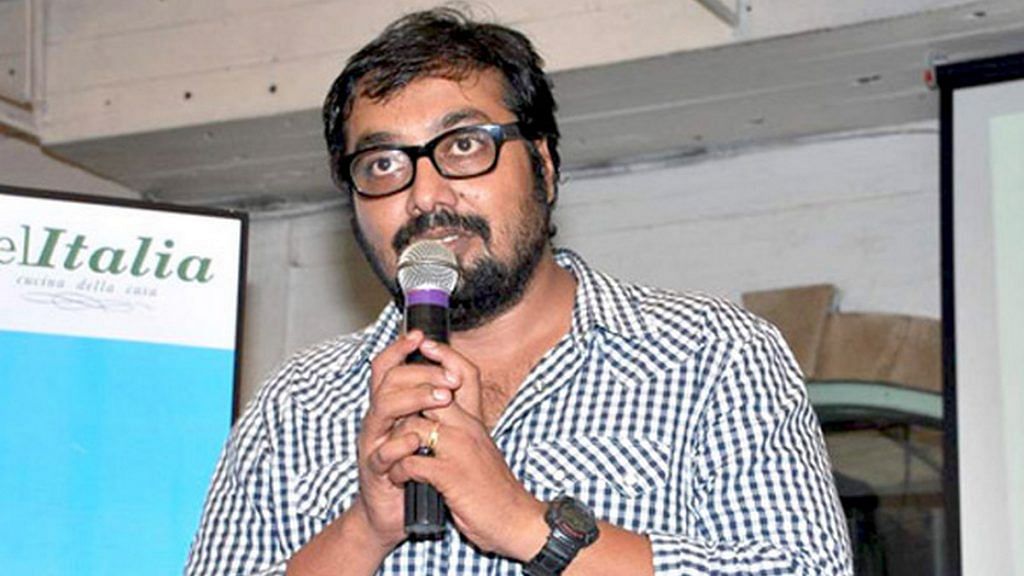Director and producer Anurag Kashyap has reclaimed his street credibility.
“Yeh Wasseypur hai, yahan kabootar bhi ek pankh se udta hai, doosre se izzat bachata hai (This is Wasseypur, even a bird flies with one wing, and uses the other to protect its dignity)”. Until he stepped back into Twitterverse on 16 December after the violence unleashed on students at Jamia Millia Islamia and Aligarh Muslim University, Gangs of Wasseypur director Anurag Kashyap was much like the kabootar. But then he decided he had had enough. Now Deepika Padukone standing at Jawaharlal Nehru University, in solidarity with students, is his new Twitter profile cover photo.
As he told ThePrint while promoting his episode of Netflix’s Ghost Stories: “Enough is enough. They came for me, threatened my parents, even my daughter. But after a certain point, you have to speak up.” And how.
Also read: JNU attack: Students protest outside Gateway of India in Mumbai, celebrities react on Twitter
Tweeting for the nation
Anurag Kashyap has since been on a roll.
The filmmaker tweeted on 16 December that “this has gone too far… can’t stay silent any longer. This government is clearly fascist… and it makes me angry to see voices that can actually make a difference stay quiet”.
He has called the Narendra Modi government illiterate at a protest in Mumbai (‘bahut zyada anpadh’). Kashyap has given a TV interview declaring “that the government has divided people into deshbhakts and deshdrohis”. This, in response to Rajdeep Sardesai’s question: “Anurag Kashyap ko gussa kyun aata hai?” He has also thanked people on Twitter for endorsing his views, saying he thought he was tweeting in isolation.
And he’s done lots more. Apart from retweeting what others have tweeted about the JNU violence being a masked attack, he has shown humour and sarcasm in dismissing trolls, who have questioned everything from his insomnia to him “selectively” singing the national anthem. And he has changed his DP to reflect his sentiments, sometimes Orijit Sen’s drawing of two masked men with lathis, and recently to a photograph of Deepika Padukone in JNU.
Also read: Deepika at JNU: Promoting Chhapaak or breaking Bollywood stars’ safe silence on politics?
The angry young filmmaker
Kashyap has had an uneven relationship with Twitter, quitting in August last year over trolling when he expressed his views on the dilution of Article 370. So, what has made him and others like him speak up now? His friend, sometime-producing partner and co-director of Sacred Games, Vikramaditya Motwane has a two-word answer for ThePrint: “Anger, mostly.”
Filmmaker and former magazine editor Pritish Nandy has a more detailed response about the industry reaction, especially about criticism on its perceived silence: “Many are speaking out,” he told ThePrint. “Javed Akhtar, Swara Bhasker, Anurag Kashyap, Farhan Akhtar, Richa Chadhha, Anubhav Sinha, Sidharth, and others such as Huma Qureshi and Radhika Apte who have acted in streaming shows that have clearly and boldly taken a position. Then there’s Dibakar Banerjee, who made a political statement in his episode of Ghost Stories.”
You cannot expect, Nandy notes, Salman Khan, Shah Rukh Khan and Aamir Khan to take a position because they will be immediately be trolled as anti-national Muslims. “That is the most difficult thing to do today,” he says. “Be a famous Muslim and stand up to the state. It will endanger your producers. But the very fact that Union minister Piyush Goyal’s get together in Mumbai did not have a single important figure from the film industry speaks volumes,” he adds. By staying away, they are making a very important statement.
But the original angry young moviemaker is owning his anger publicly again. Kashyap is lashing out, throwing slurs back at the Right-wing, even calling Shah and Modi terrorists and ‘tukde tukde gang’.
Hashtags pushed him away, but another hashtag brought him back. He is even now floating #LetsTakeOurCountryBack. At a time when voices like those of Piyush Mishra have fallen silent, Kashyap has found his. And in all this, the other big face of anger, Amitabh Bachchan, just tweeted his 3,604th tweet. And unsurprisingly, not a word on what’s going on in India.
Also read: Vicky Kaushal, Bhumi Pednekar— actors in selfie with PM Modi speak up over Jamia protests
His satya
Kashyap has long been a favourite of the millennials for whom Dev D (2009) is a radical spin on Devdas with its flawed male hero and its strong women. Gangs of Wasseypur (2012), the coal mafia saga, not only gave the industry the incredible talents of Nawazuddin Siddiqui and Pankaj Tripathi, till then languishing in minor roles, but also raised the bar for authentic, ambitious and rooted storytelling.
Since then, the writer of movies such as Ram Gopal Varma’s Satya has made films and digital content at a steady clip, even for a while become part of Phantom Films, a powerful producing quartet with Motwane, Vikas Bahl and Madhu Mantena. The company split over allegations of #MeToo against Bahl. Bahl, in turn, called Kashyap and Motwane “opportunists”. Kashyap’s public stand on some others accused in #MeToo has been somewhat equivocal.
In 2015, he had told India Today he was ready to leave forever the city that had shaped him – Mumbai. But clearly, the director whose Twitter bio says he is “neither left nor right not centre, I am diagonal” has chosen to stay and fight, not merely for his city but for India, going back to the streets that first inspired his storytelling.
He chose to turn up at the Gateway of India, with others from Bollywood. Like a true director, voicing and shaping a nation’s rage.
The author is a senior journalist. Views are personal.
